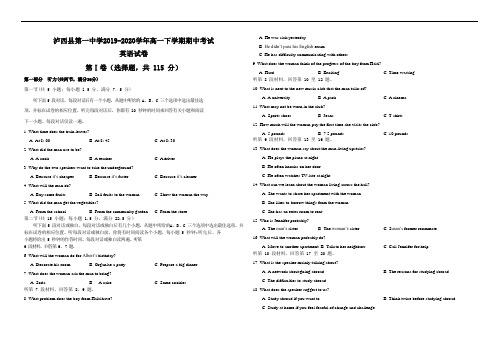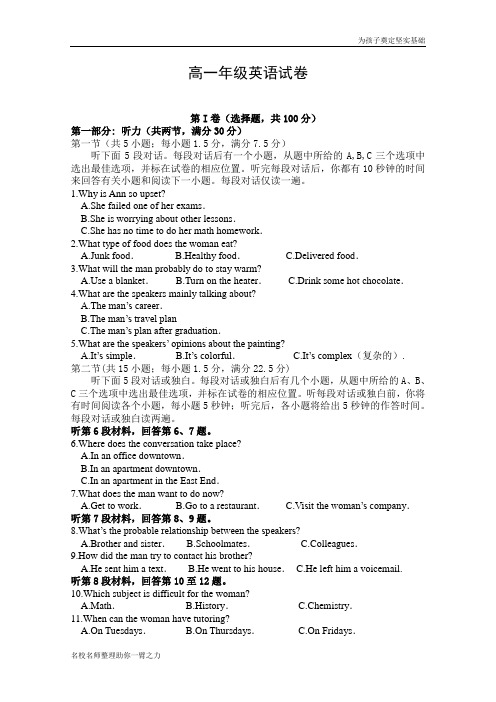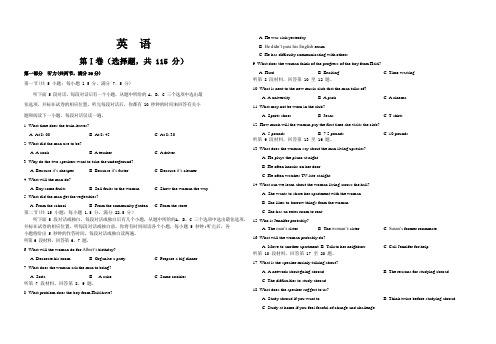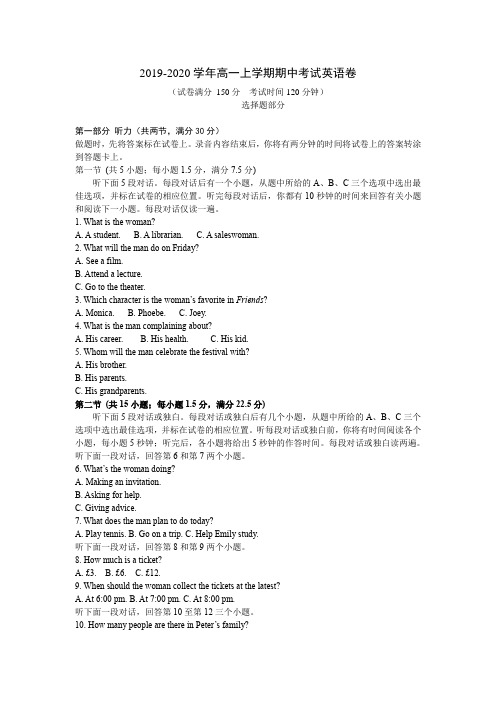云南省红河州泸西一中2019-2020学年高一英语上学期期中试题
- 格式:doc
- 大小:73.00 KB
- 文档页数:11

泸西县第一中学2019-2020学年高一下学期期中考试英语试卷第Ⅰ卷(选择题,共 115 分)第一部分听力(共两节,满分30 分)第一节(共 5 小题;每小题 l 5 分,满分 7.5 分)听下面5 段对话。
每段对话后有一个小题,从题中所给的 A、B、C 三个选项中选出最佳选项,并标在试卷的相应位置。
听完每段对话后,你都有 l0 秒钟的时间来回答有关小题和阅读下一小题。
每段对话仅读一遍。
1.What time does the train leaves?A. At 8: 00.B. At 8: 45.C. At 8: 30.2.What did the man use to be?A. A cook.B. A teacher.C. A driver.3.Why do the two speakers want to take the underground?A. Because it’s cheaper.B. Because it’s faster.C. Because it’s cleaner.4.What will the man do?A. Buy some fruits.B. Sell fruits to the woman.C. Show the woman the way.5.What did the man get the vegetables?A. From the school.B. From the community garden.C. From the store.第二节(共 15 小题;每小题 1.5 分,满分 22.5 分)听下面 5 段对话或独白。
每段对话或独白后有几个小题,从题中所给的A、B、C 三个选项中选出最佳选项,并标在试卷的相应位置。
听每段对话或独白前,你将有时间阅读各个小题,每小题 5 秒钟;听完后,各小题将给出 5 秒钟的作答时间。
每段对话或独白读两遍。

高一年级英语试卷第I卷(选择题,共100分)第一部分: 听力(共两节,满分30分)第一节(共5小题;每小题1.5分,满分7.5分)听下面5段对话。
每段对话后有一个小题,从题中所给的A,B,C三个选项中选出最佳选项,并标在试卷的相应位置。
听完每段对话后,你都有10秒钟的时间来回答有关小题和阅读下一小题。
每段对话仅读一遍。
1.Why is Ann so upset?A.She failed one of her exams.B.She is worrying about other lessons.C.She has no time to do her math homework.2.What type of food does the woman eat?A.Junk food.B.Healthy food.C.Delivered food.3.What will the man probably do to stay warm?e a blanket.B.Turn on the heater.C.Drink some hot chocolate.4.What are the speakers mainly talking about?A.The man’s career.B.The man’s travel planC.The man’s plan after graduation.5.What are the speakers’ opinions about the painting?A.It’s simple.B.It’s colorful.C.It’s complex(复杂的).第二节(共15小题;每小题1.5分,满分22.5分)听下面5段对话或独白。
每段对话或独白后有几个小题,从题中所给的A、B、C三个选项中选出最佳选项,并标在试卷的相应位置。
听每段对话或独白前,你将有时间阅读各个小题,每小题5秒钟;听完后,各小题将给出5秒钟的作答时间。

英语第Ⅰ卷(选择题,共 115 分)第一部分听力(共两节,满分30 分)第一节(共 5 小题;每小题 l 5 分,满分 7.5 分)听下面 5 段对话。
每段对话后有一个小题,从题中所给的 A、B、C 三个选项中选出最佳选项,并标在试卷的相应位置。
听完每段对话后,你都有 l0 秒钟的时间来回答有关小题和阅读下一小题。
每段对话仅读一遍。
1.What time does the train leaves?A. At 8: 00.B. At 8: 45.C. At 8: 30.2.What did the man use to be?A. A cook.B. A teacher.C. A driver.3.Why do the two speakers want to take the underground?A. Because it’s cheaper.B. Because it’s faster.C. Because it’s cleaner.4.What will the man do?A. Buy some fruits.B. Sell fruits to the woman.C. Show the woman the way.5.What did the man get the vegetables?A. From the school.B. From the community garden.C. From the store.第二节(共 15 小题;每小题 1.5 分,满分 22.5 分)听下面 5 段对话或独白。
每段对话或独白后有几个小题,从题中所给的A、B、C 三个选项中选出最佳选项,并标在试卷的相应位置。
听每段对话或独白前,你将有时间阅读各个小题,每小题 5 秒钟;听完后,各小题将给出 5 秒钟的作答时间。
每段对话或独白读两遍。
听第 6 段材料,回答第 6、7 题。
6.What will the woman do for Albert’s birthday?A. Decorate his room.B. Organize a party.C. Prepare a big dinner.7.What does the woman ask the man to bring?A. Soda.B. A cake.C. Some cookies.听第 7 段材料,回答第 8、9 题。

2019-2020学年高一上学期期中考试英语卷(试卷满分150分考试时间120分钟)选择题部分第一部分听力(共两节,满分30分)做题时,先将答案标在试卷上。
录音内容结束后,你将有两分钟的时间将试卷上的答案转涂到答题卡上。
第一节(共5小题;每小题1.5分,满分7.5分)听下面5段对话。
每段对话后有一个小题,从题中所给的A、B、C三个选项中选出最佳选项,并标在试卷的相应位置。
听完每段对话后,你都有10秒钟的时间来回答有关小题和阅读下一小题。
每段对话仅读一遍。
1. What is the woman?A. A student.B. A librarian.C. A saleswoman.2. What will the man do on Friday?A. See a film.B. Attend a lecture.C. Go to the theater.3. Which character is the woman’s favorite in Friends?A. Monica.B. Phoebe.C. Joey.4. What is the man complaining about?A. His career.B. His health.C. His kid.5. Whom will the man celebrate the festival with?A. His brother.B. His parents.C. His grandparents.第二节(共15小题;每小题1.5分,满分22.5分)听下面5段对话或独白。
每段对话或独白后有几个小题,从题中所给的A、B、C三个选项中选出最佳选项,并标在试卷的相应位置。
听每段对话或独白前,你将有时间阅读各个小题,每小题5秒钟;听完后,各小题将给出5秒钟的作答时间。
每段对话或独白读两遍。
听下面一段对话,回答第6和第7两个小题。
6. What’s the woman doing?A. Making an invitation.B. Asking for help.C. Giving advice.7. What does the man plan to do today?A. Play tennis.B. Go on a trip.C. Help Emily study.听下面一段对话,回答第8和第9两个小题。
云南省红河州泸西一中2019-2020学年高一英语上学期期中试题第Ⅰ卷(选择题,共 115 分)第一部分听力(共两节,满分 30 分)做题时,先将答案标在试卷上,录音内容结束后,你将有两分钟的时间将试卷上的答案转涂到答题卡上。
第一节(共 5 小题;每小题 l 5 分,满分 7.5 分)听下面 5 段对话。
每段对话后有一个小题,从题中所给的 A、B、C 三个选项中选出最佳选项,并标在试卷的相应位置。
听完每段对话后,你都有 l0 秒钟的时间来回答有关小题和阅读下一小题。
每段对话仅读一遍。
1. What season is it now?A. Spring.B. Autumn.C. Winter.2. Who stole the phone?A. A young girl.B. A young man.C. A middle-aged man.3. Where are the speakers probably?A. In a watch store.B. In a restaurant.C. In a cinema.4. What is the man doing?A. Asking the way.B. Booking a room.C. Watching a show.5. What is the woman’s favorite sport?A. Swimming.B. Football.C. Tennis.第二节(共 15 小题;每小题 1.5 分,满分 22.5 分)听下面 5 段对话或独白。
每段对话或独白后有几个小题,从题中所给的 A、B、C 三个选项中选出最佳选项,并标在试卷的相应位置。
听每段对话或独白前,你将有时间阅读各个小题,每小题 5 秒钟;听完后,各小题将给出 5 秒钟的作答时间。
每段对话或独白读两遍。
听第 6 段材料,回答第 6、7 题。
6. Why did the man give up the clock?A. Lisa has got one.B. It means bad luck.C. Lisa doesn’t need it.7. What will the speakers do tomorrow?A. Attend Lisa’s wedding.B. Do some shopping.C. Choose some paintings.听第 7 段材料,回答第 8、9 题。
8. What is the probable relationship between the speakers?A. NeighborsB. Workmates.C. Husband and wife.9. What will the man do?A. Go outdoors.B. Go to work.C. Wait for the phone call.听第 8 段材料,回答第 10 至 12 题。
10. Why are arm exercises encouraged?A. To keep fit.B. To keep arms strong.C. To reduce blood pressure.11. What was the man’s weight in 2013?A. 70kg.B. 75kg.C. 80kg.12. What is one of the most popular exercises according to the man?A. Running.B. Swimming.C. Bike riding.听第 9 段材料,回答第 13 至 16 题。
13. What can the woman hardly find on the radio?A. Her favorite music.B. Good talk shows.C. Good news.14. What is terrible to the woman?A. Hosts ignoring different ideas.B. Callers arguing with hosts.C. Hosts being impolite to callers.15. When do the woman listening to the radio?A. While she is working.B. While she is driving.C. While she is shopping.16. What does the woman think of radio playing?A. Boring.B. Joyful.C. Out of date.听第 10 段材料,回答第 17 至 20 题。
17. What is the speaker talking about?A. The history of guide dogs.B. The history of the Guide Dogs School.C. The way of training a dog to be a guide.18. Who did the first guide dog help?A. A doctor.B. A soldier.C. A blind man.19. What did Germany do?A. It built a dog hospital.B. It started a training program.C. It opened a guide dog school.20. How long does it take to train a dog to be a guide?A. About 4 months.B. About 14 months.C. Over 2 years.第二部分阅读理解(共两节,满分 40 分)第一节(共 15 小题;每小题 2 分,满分 30 分)阅读下列短文,从每题所给的四个选项(A、B、C、D)中,选出最佳选项,并在答题卡上将该项涂黑。
AJack London is a famous American writer. His most widely known book is The Call of the Wild, the story of the adventures of a large dog in the frozen north. Jack London was born on January 12, 1876, in San Francisco, California. His family was very poor, and Jack had to leave school to make money. He worked hard at many different jobs.Later, Jack returned to school, but he didn’t stay. He wrote, “Life and poc ket book were both too short.” In 1897, he went to Alaska to find gold. Instead, he found ideas for his books’ stories. He returned home and started to write. His writings were successful, and he became rich and famous in his twenties.Jack London was not a happy man, however. In poor health, he died in 1916. He was then only 40 years old.21. Jack London left school because .A. he had to completed his educationB. he had to work to help his familyC. he wanted to become a writerD. he wanted to find gold22. Jack London went to Alaska to .A. find ideas for his booksB. find jobsC. find goldD. write his books and stories23. In which order did Jack London do the following things?a. became rich and famous in his twentiesb. worked hard at many different jobsc. had to leave school to make moneyd. went to Alaska to find golde. returned home and started to writeA. c, b, d, e, aB. a, c, b, d, eC. b, d, e, a, cD. c, e, d, b, aBEveryone needs friends. We all like to feel close to someone. It is nice to have a friend to talk, laugh, and do things with. Surely, there are times when we need to be alone. We don’t always want people around. But we would feel very lonely if we never had a friend.No two people are just the same. Sometim es friends don’t get on well. That doesn’t mean that they no longer like each other. Most of the time they will make up and go on being friends.Sometimes friends move away. Then we feel very sad. We miss them very much. But we can call them and write to them. It could be that we will even see them again. And we can make new friends. It is surprising to find out how much we like new people when we get to know them.Families sometimes name their children after a close friend. Many places are named after men and women who have been friendly to people in town. Some parks are named this way. So are some schools. We think of these people when we go to these places.There is more good news for people who have friends. They live longer than people who don’t. Why? It could be that they are happier. Being happy helps you stay well. Or it could be just knowing that someone cares. If someone cares about you, you take better care of yourself.24. According to the text, we need friends for the following reasons except that .A. we all like to feel close to someoneB. we need to be aloneC. it is nice to have a friendD. we would feel very lonely without a friend25. The underlined phrase in the paragraph means “______”.A. put some special powder on the faceB. become friends again after a quarrelC. invent something in order to cheat somebodyD. put something together from several different things26. From the passage we can learn that .A. no one in the world needs friendsB. people always need friends around themC. it’s nice to have new friends than to have old friendsD. having friends is one of the nicest things in the world27. People will live longer if they have friends because .A. they feel happier and stay healthyB. they get a lot of help from their friendsC. they take better care of themselves than their familiesD. your friends care for you very much .CA year ago, I paid no attention to English idioms, though my teacher said that they were important again and again. But soon, the importance of English idioms was shown in an amusing experience.One day, I happened to meet an Englishman on the road, and soon we began to talk. As I was talking about how I was studying English, the foreigner seemed to be astonished gently shaking his hea d, shrugging his shoulders, saying, “You don’t say!” “You don’t say!” I was puzzled. I thought, perhaps this is not an appropriate topic. “Well, I’d better change the topic.” So I said to him, “Well, shall we talk about the Great Wall? By the way, have you ever beenthere?” “Certainly, everyone back home will laugh at me if I leave China without seeing it. It is magnificent.” He was deep in thought when I began to talk like a guide, “The Great Wall is one of the wonders in the world. We are proud of it.” S oon I was interrupted again by his order, “You don’t say!” I couldn’t help asking.I said, “Didn’t you say you don’t say?” Hearing this, the Englishman laughed to tears. He began to explain, “You don’t say actually means really? It is an expression of surp rise. Perhaps you don’t pay attention to English idioms.” Only then did I realize I had made a fool of myself. Since then, I have been more careful with English idioms.28. A year ago, I paid no attention to English idioms because ______.A. English idioms were too difficult to masterB. I cared little about the teacher’s wordsC. my teacher didn’t emphasize the importanceD. I had no interest in English learning29. When I first heard “You don’t say”, I thought ______.A. the Englishman was not interested in my English studiesB. the Englishman was only interested in the Great WallC. I had talked too muchD. I had to stop talking at once30. We can learn from the paragraph that______ .A. the Englishman was leaving China without seeing the Great WallB. the Englishman wanted to see the Great Wall after I talked about itC. the Englishman wanted me to act as his guideD. the Englishman visited the Great Wall and thought it worth visiting31. After the Englishman explained the idiom,______ .A. the Englishman made me a foolB. the Englishman made a fool of himselfC. I felt very sillyD. I felt proud of my understandingDA little knowledge and a few precautionary measures(预防措施)can greatly increase your chances of surviving an earthquake. The keys are education and preparing in advance. Or when it happens, it is too late that your take a booklet to learn then. The earthquake safety tips below will not make you an expert. However, they could make a life-saving difference if you find yourself in an earthquake situation.Before the EarthquakeTeach all members of your family about earthquake safety. This includes the actions you should take when an earthquake occurs, the safe places in a room such as under a strong desk, along walls, and places to avoid such as near windows, large mirrors, hanging objects, heavy furniture and fireplaces.During the EarthquakeIf you are indoors, stay there. Quickly move to a safe location in the room such as under a strong desk, under a strong table, or along an wall.If you are outdoors, move to an open area there falling objects are unlikely to strike you. Move away from buildings, power lines(电线杆) and trees.If you are driving, slow down smoothly and stop on the side of the road. Avoid stopping on or under bridges, or under power lines, tress and large signs. Stay in your car.After the EarthquakeCheck for damage. If your building is badly damaged you should leave it quickly. if you smell or hear a gas leak(煤气泄漏), get everyone outside and open windows and doors. If you can do it safely, turn off the gas. Report the leak to the gas company and fire department. Do not use any electrical appliances because a tiny spark could make the gas burn suddenly.32. What are the key points of surviving an earthquake?A. Learning some tips when an earthquake happens.B. Consult the experienced survivors.C. Education and preparing in advance.D. Leave where earthquakes often happen.33. What does the underlined word “it”in Paragraph 1 mean?A. The survival.B. The tool.C. The booklet.D. The earthquake.34. What do bridges mean when an earthquake happens?A. Danger.B. Safety.C. Energy.D. Help.35. What you should do when you find your house is badly damaged after the earthquake?A. Stay where you are.B. Leave the house quickly.C. Phone 119.D. Find your dear possessions.第二节(共 5 小题;每小题 2 分,共 10 分)根据短文内容,从短文后的七个选项中选出能填入空白处的最佳选项。